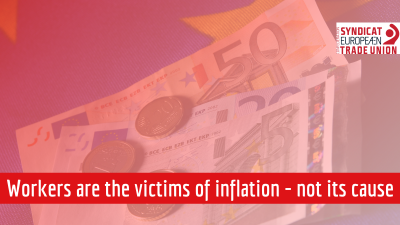An unprecedented increase in interest rates will have a direct and harmful impact on working people, the European Trade Union Confederation is warning.
The European Central Bank has announced that the interest rate on the main refinancing operations and the interest rates on the marginal lending facility and the deposit facility will be increased to 3.00%, 3.25% and 2.50% respectively from February 8.
The decision came despite the fact the monthly inflation figures have been negative for the last three months in a row and the Euro area inflation rate for January is lower than expected.
It came on the same day that oil giant Shell announced it made profits of €38.5 billion last year – double the profit the company made in 2021 and the highest in its 115 year history.
ETUC General Secretary Esther Lynch said:
“These increases will not address the underlying causes of inflation, which are firmly embedded on the supply side of the economy. Instead, they will increase the pressure on working people, since low-wage workers and households spend a larger part of their income on food and energy.
"Furthermore, many price-setters in the housing market may now pass the higher costs of doing business on to renters. All this comes at a time when real wages are falling.
“Raising rates doesn’t help when the main inflation drivers are external, like global energy and food prices. This rise also increases the risk of a recession, which is a bigger danger for the economy and would be devastating for families and businesses.
"It’s clear from Shell’s announcement that it’s record profits which are driving inflation and that’s where policy makers should be taking action instead of hitting again the primary victims of this crisis.
"Rate increases imply larger interest payments to commercial banks and loss of revenue for national governments. This will negatively affect the ability of Member States to support the most vulnerable citizens and workers, and to finance public services or make investments needed to deliver the green and digital transitions.
“The ECB would be wiser to adopt a wait and see approach with proper data driven policies. Drastic increases in renewable energy investment should be a top priority. With such increases in interest rates, such large investment needs will be difficult to fulfil. As stated by Executive board member Isabel Schnabel this year, “renewable energies are more competitive when interest rates are low”."
Notes
Speech by Isabel Schnabel: https://www.ecb.europa.eu/press/key/date/2023/html/ecb.sp230110~21c89bef1b.en
Statement: Workers will pay the price for the ECB rates rise | ETUC

